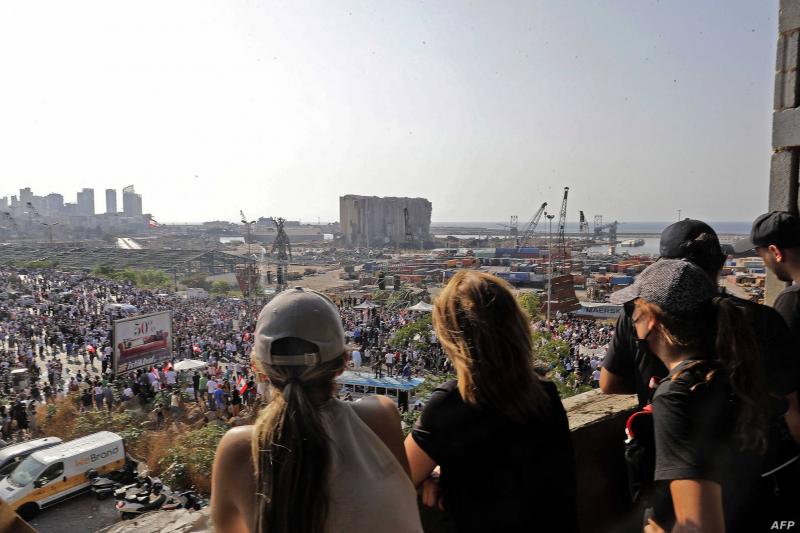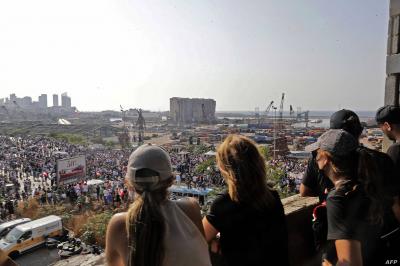The "Lifeline" dedicated to suicide prevention and support at the "Embrace" mental health organization in Lebanon is constantly ringing. One caller threatens to kill himself because he cannot provide for his children, while another shares his loss of hope in life after becoming homeless. Meanwhile, teenagers express profound feelings of depression.
This year, the number of calls received by the organization has doubled, with 1,100 calls monthly—dozens each day—amid the accelerating economic collapse that Lebanon has been experiencing for two years, which has resulted in a shortage of medications, including those for depression and anxiety attacks.
Following an economic collapse that began two years ago and worsened with the horrific Beirut port explosion on August 4, 2020, tens of thousands have found themselves unemployed, or their salaries have become worthless after the Lebanese pound lost nearly 90 percent of its value against the dollar.
Mia Atoui, one of the founders of the organization, recounts a morning call at five-thirty from a 31-year-old homeless man who wants to commit suicide at the busy Ring intersection in central Beirut. She added, "Before that, we received a call from a father living in the Bekaa region who wanted to kill himself because he could no longer feed his four children. We receive similar calls every day as the crisis has significantly worsened the situation."
The organization was compelled to extend call hours from 17 to 21 hours a day, with the possibility of reaching 24 hours. Meanwhile, their psychiatric clinic has appointments booked until the end of October, with hundreds still on waiting lists.
Requests for psychological support are not limited to adults; the organization has been receiving calls from minors under 18. This age group accounted for 15 percent of calls in July, compared to ten percent in previous months.
In a country where the minimum wage is 675,000 pounds, approximately 45 dollars at the black market exchange rate, food prices have risen by 700 percent. Many Lebanese are forced to pay at least one million pounds (66 dollars) monthly for private generators due to chronic electricity outages.
Lebanese suffering has been compounded by the COVID-19 pandemic and its impacts on mental health, followed by the shock of the port explosion that killed at least 214 people, injured over six thousand others, and destroyed neighborhoods in Beirut.
Fadi Malouf, director of the Psychiatry Department at the American University Hospital, one of the main medical facilities in Lebanon, notes an increase in patients visiting psychiatric clinics. He stated, "We are certainly seeing cases of depression and anxiety attacks, and advanced cases of them," explaining that the situation has worsened for two reasons: the migration of many psychiatrists leaving behind patients struggling to find alternatives, and the shortage of sedative and antidepressant medications, which in some cases leads to suicide.
Some patients have had to reduce their treatment to preserve their limited medication supplies, resulting in worsening mental health conditions. He added, "We have even seen patients decide to stop taking their medications altogether, which exacerbates their depression and makes them more prone to suicide, ending up in emergency rooms." He clarified, "These are patients whose conditions were previously stable."
With the rising demand for appointments, psychologist Ninar Eknadyousan works 13 hours a day, finishing one session to start another. She believes that the rapid succession of crises in Lebanon necessitates that psychiatrists find approaches that offer quick and focused solutions. She said, "It's like we are providing psychological first aid; all we do is control the damage." However, in a country where about 80 percent of the population lives below the poverty line, many cannot secure their daily sustenance, let alone pay for therapy sessions.
Moghali Eid (23 years old), a volunteer responding to calls at "Embrace," shared, "Last month, we received a call from a widow who cannot provide food for her children. She sounded lost, asking whether she should kill herself and her children or just herself."
Bashra (26 years old), also a volunteer at "Embrace," feels that her work has become like an "impossible mission" to save callers suffocating under crises, stating, "We must give them hope in a country where there is no longer space for hope."




